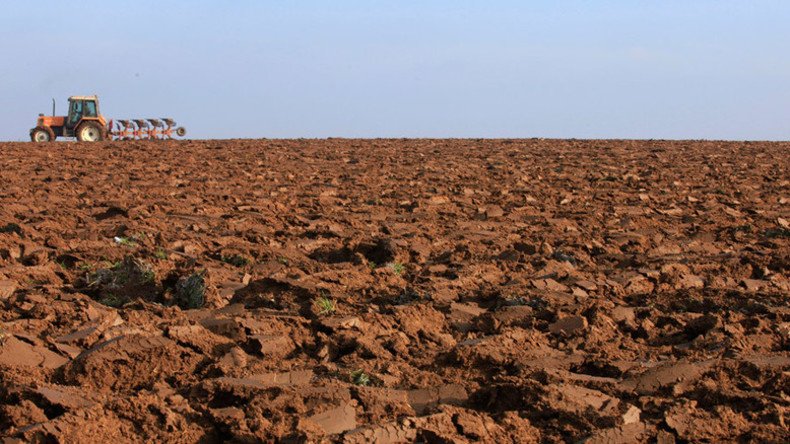‘Catastrophic’: World has lost 33% of arable land in 40yrs, study says

One third of the world’s arable land has been lost to erosion or pollution over the last 40 years, according to a new report. The study’s authors call for vital action, warning that the global disaster could have severe effects on world food production.
The study, conducted by researchers at the University of Sheffield’s Grantham Centre for Sustainable Futures, involved analyzing numerous pieces of research published over the past decade. The scientists concluded that nearly 33 percent of the world’s adequate or high-quality food-producing land has been lost at a speed surpassing nature’s ability to replace diminished soil.
“Soil is lost rapidly but replaced over millennia and this represents one of the greatest global threats for agriculture,” said Duncan Cameron, professor of Plant and Soil Biology at the University of Sheffield, as quoted by Phys.org. He added that “erosion rates from ploughed fields average 10-100 times greater than rates of soil formation.”
Global Climate March: Rallies in Australia, Germany, Spain, UK against climate change https://t.co/fD0clncreZpic.twitter.com/GXJdA4GxQ4
— RT (@RT_com) November 29, 2015The researcher went on to note that “it takes about 500 years to form 2.5 centimeters of topsoil under normal agricultural conditions,” adding that if nothing is done, the world will move towards a situation similar to North America’s dust bowl in the 1930s.
The erosion of soil has mostly occurred due to a loss of structure caused by the continuous disturbances of crop planting and harvesting. If soil is repeatedly turned over, it is exposed to oxygen and its carbon is released into the atmosphere – a combination which results in the soil failing to bind as effectively. As a result, the soil’s ability to store water decreases, which negatively impacts its ability to effectively act as a buffer to floods and a healthy base for plants. Deforestation has also been dubbed detrimental to soil health.
The researchers, who spoke at the United Nations Conference on Climate Change on Wednesday, described the loss as “catastrophic,” adding that major changes to agricultural practices must be made.
Climate change could push 100mn people into extreme poverty by 2030 - WB report https://t.co/Lo8LzObCiNpic.twitter.com/KWJq0sSI1c
— RT (@RT_com) November 9, 2015“We aren’t quite at the tipping point yet, but we need to do something about it. We are up against it if we are to reverse this decline,” Cameron said, as quoted by the Guardian.
Those taking part in the study suggested a number of possible solutions to the soil loss, including recycling nutrients from sewage, using biotechnology to wean plants of fertilizer dependence, and rotating crops with livestock areas to relieve pressure on arable land.
Global warming trigger: Alaska fires burn millions of acres, threaten carbon-rich permafrost http://t.co/w6tO6tnMAypic.twitter.com/lzQ50mHLmd
— RT (@RT_com) July 27, 2015“We need to take land out of production for a long time to allow soil carbon to rebuild and become stable. We already have lots of land – it’s being used for pasture by the meat and dairy industries. Rather than keep it separated, we need to bring it into rotation, so that that there is more land in the system and less is being used at any one time,” Cameron said.
The drastic decline in soil comes as the world’s demand for food is rapidly increasing. It is estimated that the world will need to grow 50 percent more food by 2050 to feed an anticipated population of nine billion people.
READ MORE: Animal Farm: China to build ‘world’s largest cloning factory’












